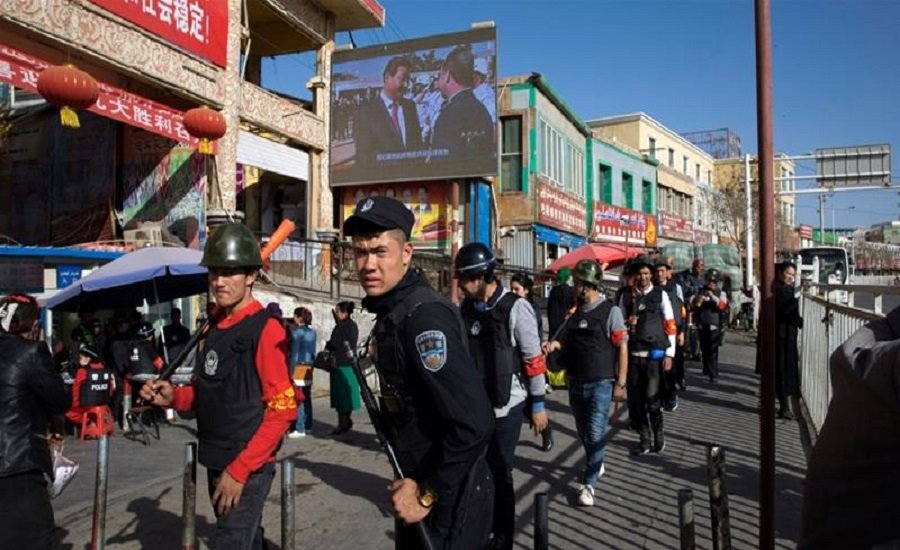Leaked list of over 2,000 detainees reveals automated repression, says Human Rights Watch
Team Clarion
NEW DELHI – A big data programme for policing in China’s Xinjiang region arbitrarily selects Turkic Muslims for possible detention. Among the reasons for detention are wearing a veil, studying the Quran or going on the Haj pilgrimage, says Human Rights Watch (HRW) in a report released in New York on Wednesday.
A leaked list of over 2,000 detainees from Aksu prefecture provided to Human Rights Watch is further evidence of China’s use of technology in its repression of the Muslim population. The big data program, the Integrated Joint Operations Platform (IJOP), apparently flagged the people on the Aksu List, whom officials then evaluated and sent to “political education” camps in Xinjiang.
“The Aksu List provides further insights into how China’s brutal repression of Xinjiang’s Turkic Muslims is being turbocharged by technology,” said Maya Wang, senior China researcher. “The Chinese government owes answers to the families of those on the list: why were they detained, and where are they now?”
Human Rights Watch first reported on the IJOP in February 2018, noting that the policing program aggregates data about people from various sensory systems in Xinjiang, and flags to officials those it deems potentially threatening. Officials then evaluate these individuals’ “general performance” together with other sources of information, and send some to political education camps and other facilities. Human Rights Watch “reverse engineered” the IJOP mobile app in May 2019 and revealed the dubious criteria this mass surveillance system was programmed to flag, including many lawful behaviours.
Human Rights Watch’s analysis of the Aksu List strongly suggests that the vast majority of the people flagged by the IJOP system are detained for everyday lawful, non-violent behaviour. This contradicts the Chinese authorities’ claims that their “sophisticated,” “predictive” technologies, like the IJOP, are keeping Xinjiang safe by “targeting” criminals “with precision.”
The United Nations estimates that more than one million Turkic Muslims – most of them ethnic Uighurs – have been detained in camps in far-western Xinjiang. Activists say the purpose of the detention was to “erase the ethnic and religious identities of” Turkic Muslims and ensure their loyalty to the Chinese government.
Beijing denies the accusations, describing the camps as vocational training centres to help stamp out “religious extremism” in the troubled province.
The mass surveillance and arbitrary detention of Xinjiang’s Turkic Muslims violate fundamental rights under China’s constitution and international human rights law. Article 37 of the constitution states that all arrests must be approved by either the procuratorate (the state prosecution agency) or the courts.
Yet Human Rights Watch research indicates that neither agency appears to be involved in these detentions. Rather, administrative officials, including police officers, make the sole decision to detain someone. Those facing detention have no right to due process, including access to lawyers and family members, or a chance to stand trial to contest such allegations. The use of intrusive surveillance, including in and around people’s homes, also violates everyone’s right to privacy.
“‘Predictive policing’ platforms are really just a pseudo-scientific fig leaf for the Chinese government to justify vast repression of Turkic Muslims,” Wang said. “The Chinese government should immediately shut down the IJOP, delete all the data it has collected, and release everyone arbitrarily detained in Xinjiang.”
The Aksu List, dated around late 2018, is similar to another leaked file, the Karakax List. That list – of people detained for having relatives abroad – dated around June 2019, provides an assessment of whether an individual should remain in detention. The IJOP is also repeatedly mentioned in the Karakax List. Together the lists provide two snapshots of Xinjiang’s bureaucracy, as it picks and vets its victims in the process of coerced thought transformation: the decision to detain people and the decision to keep them in detention. At both stages, the IJOP system assists officials in selecting targets.
The Aksu List: Authentication
In August, Radio Free Asia’s Uyghur Service provided Human Rights Watch with an Excel spreadsheet titled “List of IJOP Trainees” with the names of over 2,000 people obtained from an anonymous Xinjiang source in late 2018. The sheet has columns that include the person’s name, gender, the date of their detention in a political education camp, the reason for their detention, the number of their detention facility or cell, the batch number from which the IJOP systems picked them out, and the reason why, usually no more than a sentence or two.
Although the sender has not been identified, the list appears to come from a part of Aksu prefecture where 80 percent of the residents are Uyghurs. Human Rights Watch is confident that all the people on the Aksu List are Uyghurs. About half of the list are men and the other half women. Their detention dates ranged from mid-2016 to late 2018. At the peak, well over 100 people were detained on a single day. To protect the source, Human Rights Watch is obscuring the precise location of the Aksu List, precise dates, and some of the numbers throughout the analysis.

